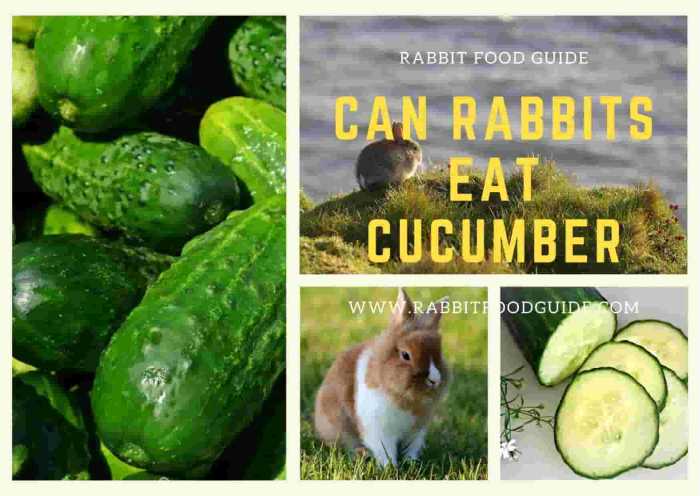Cucumbers are a refreshing and nutritious snack for humans, but can our furry friends enjoy them too? In this comprehensive guide, we’ll delve into the nutritional value, benefits, risks, and guidelines for feeding cucumbers to rabbits. Discover if this crunchy veggie is a healthy treat or a potential hazard for your beloved bunny.
Rabbits are herbivores with unique dietary needs. Understanding the nutritional composition of cucumber is crucial before offering it to your pet. Let’s explore the essential nutrients found in this refreshing vegetable and their significance for rabbits.
Nutritional Value of Cucumber for Rabbits
Cucumbers are a healthy and refreshing snack for rabbits, providing them with essential nutrients that contribute to their overall well-being. The table below Artikels the nutritional value of cucumbers per 100 grams:
| Nutrient | Amount |
|---|---|
| Calories | 16 |
| Protein | 0.7 grams |
| Carbohydrates | 3.6 grams |
| Fiber | 0.5 grams |
| Vitamin C | 12 milligrams |
| Potassium | 140 milligrams |
These nutrients play a vital role in a rabbit’s health:
- Calories: Provide energy for rabbits’ active lifestyle.
- Protein: Essential for building and repairing tissues.
- Carbohydrates: Provide a source of energy for rabbits’ digestive system.
- Fiber: Aids in digestion and prevents gastrointestinal issues.
- Vitamin C: Supports immune function and wound healing.
- Potassium: Regulates fluid balance and muscle function.
Benefits of Feeding Cucumber to Rabbits
Incorporating cucumbers into your rabbit’s diet can provide several potential health benefits:
Hydration
Cucumbers are composed of approximately 95% water, making them an excellent source of hydration for rabbits. This is especially important during hot weather or when rabbits are experiencing dehydration.
Digestive Health
The high water content in cucumbers helps promote regular bowel movements and prevent constipation. Additionally, cucumbers contain fiber, which is essential for maintaining a healthy digestive system in rabbits.
Dental Health
The act of chewing on cucumbers can help wear down a rabbit’s teeth, preventing overgrown incisors and molars. The crunchy texture of cucumbers also stimulates the gums, promoting good oral hygiene.
Weight Management
Cucumbers are low in calories and fat, making them a suitable snack for rabbits who are overweight or prone to weight gain. The high water content also promotes a feeling of fullness, helping rabbits feel satisfied with fewer calories.
Risks of Feeding Cucumber to Rabbits
While cucumbers can be a healthy treat for rabbits, it’s important to be aware of potential risks associated with feeding them this vegetable.
Overfeeding cucumbers or feeding them to rabbits with sensitive digestive systems can lead to gastrointestinal upset, including diarrhea and bloating. Additionally, cucumbers contain high levels of water, which can contribute to urinary tract problems if rabbits consume too much.
Interactions with Medications
In some cases, cucumbers can interact with certain medications that rabbits may be taking. For example, cucumbers contain vitamin K, which can interfere with the effectiveness of anticoagulant medications.
Guidelines for Feeding Cucumber to Rabbits

Cucumber can be a refreshing and nutritious treat for rabbits when fed in moderation. Here are some guidelines to ensure safe and healthy feeding:
Recommended Portion Sizes
Offer small pieces of cucumber no larger than 1-2 tablespoons per day. This amount provides essential nutrients without causing digestive upset.
Frequency of Feeding
Limit cucumber treats to 2-3 times per week. Overfeeding can lead to diarrhea and other digestive issues.
Preparation Methods
*
-*Wash thoroughly
Rinse cucumbers under running water to remove any pesticides or bacteria.
-
-*Slice thinly
Cut cucumbers into thin slices to make them easier for rabbits to chew.
-*Remove seeds
If desired, remove the cucumber seeds as they can be difficult for rabbits to digest.
Alternatives to Cucumber for Rabbits
While cucumber can be a refreshing treat for rabbits, it’s not the only healthy vegetable option available.
Here are some nutritious alternatives that can provide a balanced diet for your furry friend:
Carrots
- Rich in vitamin A, essential for vision and immune system function
- High in fiber, aiding in digestion and preventing digestive issues
- Contains antioxidants, which protect against cell damage
Celery
- Low in calories and high in water, promoting hydration
- Contains fiber, vitamins, and minerals
- Has a diuretic effect, helping prevent urinary tract infections
Bell Peppers
- Excellent source of vitamin C, crucial for immune system health
- Rich in antioxidants, protecting against oxidative stress
- Contains fiber and potassium, supporting digestive and cardiovascular health
Spinach
- Packed with nutrients, including vitamins A, C, and K
- High in iron, promoting red blood cell production
- Contains antioxidants and anti-inflammatory compounds
Closing Summary
In conclusion, cucumbers can be a healthy and refreshing treat for rabbits when fed in moderation and as part of a balanced diet. Their high water content promotes hydration, while the fiber aids digestion and dental health. However, it’s essential to be mindful of potential risks, such as gastrointestinal upset and urinary tract problems.
By following the guidelines discussed above, you can safely incorporate cucumbers into your rabbit’s diet and provide them with a nutritious and enjoyable snack.
Helpful Answers
How often can I feed my rabbit cucumber?
Limit cucumber treats to once or twice a week, in small portions.
Can I feed my rabbit cucumber skin?
Yes, the skin is safe for rabbits to eat, but it’s recommended to wash it thoroughly before feeding.
What are some alternatives to cucumber for rabbits?
Carrots, celery, bell peppers, and spinach are excellent vegetable alternatives for rabbits.